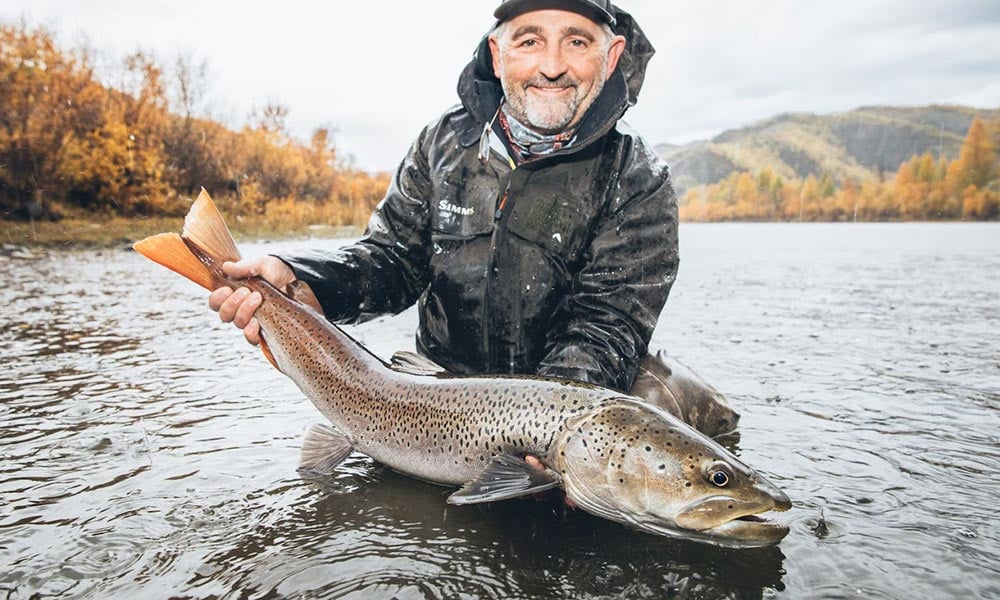Discover the best taimen trout fishing destinations, guided trips, and lodge-based experiences worldwide. Explore remote waters and world-class angling with expert local hosts.

No results available
Taimen are apex predators of remote northern rivers—ancient trout known for explosive topwater strikes and staggering size. Found primarily in Mongolia and Russia, they’re a bucket-list species for fly anglers drawn to untamed wilderness and the ultimate trout encounter.
Taimen (Hucho taimen), sometimes referred to as “river wolves,” are the largest member of the salmonid family. Native to Siberian and Central Asian drainages, they’re capable of living over 30 years and exceeding 50 inches in length. Their aggressive behavior, surface-oriented strikes, and rare habitat make them one of the most sought-after wild trout species on the planet.
Fly fishing for taimen is a visual and visceral experience—casting mouse patterns or large streamers into riffles, woody banks, and back eddies. They attack with speed and force, often leaping or twisting in shallow water. But these fish aren’t everywhere: targeting taimen requires travel deep into remote, lightly pressured watersheds, often by raft or fly-in access.
Northern Mongolia is the epicenter of modern taimen fly fishing. Protected by special-use zones and long-running conservation programs, rivers like the Delger Murun and Onon flow through sweeping steppe and forested valleys. Most trips are week-long expeditions supported by guided float camps or remote yurts.
Eastern Russia is home to vast, near-inaccessible taimen drainages such as the Tugur and the Yenisei. Fishing here is highly limited and logistically complex, but the rewards include massive, rarely seen taimen in true wilderness. Trips often require helicopters, permits, and extended planning.
Taimen are trout in size and shape but behave more like freshwater muskie—explosive, aggressive, and top-of-the-food-chain predators. They often hit flies out of territorial aggression more than hunger, making each strike feel feral and unpredictable. In terms of size, they’re in a class of their own: fish over 40 inches are common, and true giants surpass 50.
What sets them apart is their combination of prehistoric presence and wild habitat. These fish inhabit some of the least disturbed rivers left on earth, and catching one means more than a photo—it’s an encounter with a relic of freshwater evolution.
Taimen are long-bodied with powerful tails, large heads, and broad mouths built to engulf large prey. Their coloration shifts from olive-bronze to silver along the sides, with dark reddish or copper fins and faint spotting toward the back. Older fish often show worn, scarred features—adding to their primal mystique. Despite their bulk, they’re agile and fast, especially in shallow, swift water.
Water clarity and temperature are key factors, with the best fishing usually found during stable flows. Late season often produces the largest fish, especially as they feed aggressively before winter.
FishingExplora connects serious anglers to Mongolia’s best taimen operations—from raft-supported expeditions to exclusive-use rivers with strong conservation ethics. All partner lodges emphasize catch-and-release practices and strict angler limits to protect these ancient fish. Whether you’re floating a remote canyon or casting mouse patterns from a bank-side yurt, you’ll be immersed in one of the last great trout frontiers.
Taimen are the largest trout species in the world. They commonly reach 30–40 inches, with some individuals exceeding 50 inches and 40+ pounds. Their long lifespans and remote habitats contribute to this exceptional growth potential.
Surface mouse patterns are the signature choice, especially during warm months. Large streamers—6 to 10 inches—also work well, imitating baitfish or small mammals. Flies should be durable and fished aggressively.
Yes. Taimen are native to Mongolia and Russia and are found only in specific river drainages within those regions. Mongolia has become the global center for taimen conservation and catch-and-release fishing.
In Mongolia, yes—strict catch-and-release regulations are enforced to protect the species. Many Russian rivers also operate under similar rules for international anglers, often with additional conservation fees and angling limits.
Extremely. Most taimen fisheries are accessible only by 4×4, horse, or raft, often requiring domestic flights followed by hours of travel overland. This remoteness is part of what keeps the populations healthy and pressure low.